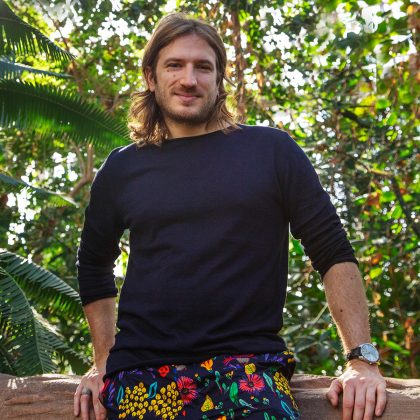The Bucketheads “The Bomb! (These Sounds Fall Into My Mind)”
The birth of our underground brand Factory 93 not only brought on an adrenaline rush reminiscent of the renegade warehouse era of raving—on which Insomniac was founded—but it also had us thinking back to all the people, places and parties that made this whole operation possible. And with that came a burning desire to crack open our collection and dust off the classic records we couldn’t live without. Through our From the Crate series, we’ll be breaking out both seminal and obscure cuts alike, imparting some knowledge in the process.
Even in the mid-’90s, there was less than a chance in hell that any randomly chosen 12-inch single would lodge in a DJ’s playlist for longer than a few weeks. Between the test-pressing white labels that the bigger jocks made for their own and their buddies’ use, the fly-by-night labels that lasted between one and five releases before going kaput, all manner of local activity within any number of specialized DJ scenes around the world, and a major-label dance music apparatus that gave the top names regular remix work on pop stars, there was no shortage of dance records to choose from by 1994. Furthermore, this was an era in which forward motion was paramount—particularly in the future-first ethos of the young rave scene, which had initially rejected house music’s soulful roots but was, by then, beginning to reconsider.
“The Bomb! (These Sounds Fall Into My Mind),” produced by Kenny “Dope” Gonzales of Masters at Work under his solo alias the Bucketheads and released in 1994, might be the most aptly named dance record of all time. Upon release, it landed everywhere—from warehouse raves in small towns to the top of the Billboard charts, where it reached #1 on the Hot Dance Music/Club Play listing in 1995. And thanks to the singsong chant of the main part, as well as the slashing horn stabs of the secondary, intro part, coming or going, the track wouldn’t leave your damn head.
The track’s title is actually a mondegreen, a mishearing that becomes a substitute for what’s there. What we have subsequently understood is that the sampled Peter Cetera lyric “These sounds fall into my mi-yi-yi-yi-yind”—from the heart-still-beating carcass of the Chicago song “Street Player” (the ultimate in dance music’s ability to wring vital juices from iffy sources)—is, in fact, “Street Sounds swirling through my mi-yi-yi-yi-yind.” Yet that mishearing is part of what makes the track tick. The words of a musician in the original, turned into joyful aural confetti, land on the dancer as a different kind of manifesto, to let the music guide you through a wonderland of clashing textures and disco flair.
The sampled original came from 1979’s Chicago 13, the corporate pop band’s first LP not to yield a hit single. But that wasn’t the first appearance of “Street Player” on record—a year earlier, Rufus ft. Chaka Khan had made it the title track of their fourth album. The groove was mild, though, and Chaka barely appears on it.
“’The Bomb!’ hit right as house music was beginning to re-embrace disco—not with the kitschy visual winks of Deee-Lite, but with a wholehearted acknowledgment that this was where the whole thing had begun.”
Chicago’s version is nine minutes instead of five, and it aimed squarely for the disco market; it even appeared as a 12-inch. Immediately, it hooks in. The groove grabs you instantly and by now is as familiar to clubgoers as, say, “Jumpin’ Jack Flash” is to a rocker. Around the 40-second mark, Cetera hits the decisive “street sounds” line (any more of his oleaginous voice would have clogged the record’s arteries). Beginning around 4:30 is a Latin percussion breakdown that provides the Bucketheads’ B-segment: the frozen-in-air horns, which Gonzales cuts like a Ginsu master, appear around 5:28 and 6:16.
“The Bomb!” hit right as house music was beginning to re-embrace disco—not with the kitschy visual winks of Deee-Lite, but with a wholehearted acknowledgment that this was where the whole thing had begun. Certainly, that was the case for Gonzales, who’d loved disco growing up and began to deconstruct it the way his hip-hop peers were doing with old funk records (Gonzales has made plenty of hip-hop tracks, as well).
“‘The Bomb’ was done on an SP and an S950,” Gonzales told Attack Magazine in 2015. He was referring to the E-mu SP-1200, a sampler that was originally manufactured in 1987 and would become, as Ben Detrick put it, “the tool of choice for East Coast beat-makers during rap’s so-called ‘Golden Age’… The machine rose to such prominence that its strengths and weaknesses sculpted an entire era of music: The crunchy digitized drums, choppy segmented samples, and murky filtered basslines that characterize the vintage New York sound are all mechanisms of the machine.” Its warmth also gave “The Bomb!” its unique texture.
Gonzales continued, “The way I used to do my beats back then, all my rhythms and my drums were in the SP, but it didn’t hold long samples, so all the long samples were in the S950, and I would trigger them from the drum machine. That’s how that record was made—and how a lot of records were made in that time period.”
Straight-up dance records like this one didn’t often cross over, but “The Bomb!” was too irresistible not to. A radio edit much shorter than the 15-minute 12-inch generated a video that was among the Box’s early hits. That edit made the record top-10 in five European countries besides the UK, where it reached #5; it even hit #49 on the Billboard Hot 100. The track was, in fact, so omnipresent for so long that some dancers began to get truly sick of it. When Midwest Raves, an early US rave mailing list, conducted a subscribers’ poll about the year in dance music, 1995, the Bucketheads’ track was voted second-most overplayed tune of the year (Josh Wink’s “I’m Ready” and “Don’t Laugh” were at 1 and 3, respectively). Consider that this poll took place in February 1996—and “The Bomb!” was, by that point, nearly two years old.
And it’s still fueling pop hits. In 2007, Pitbull flaunted his Miami-dancer and Latin-house roots by releasing the hit “I Know You Want Me (Calle Ocho),” which also runs off a bite from Chicago’s “Street Player.” But everyone knows he really got it from “The Bomb!”





